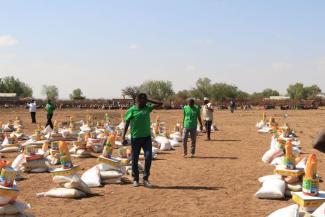Famine
Political solutions needed

The good news first: we have prevented a massive famine. The death of thousands of people has been averted. At the beginning of this year, the UN and aid organisations started warning of an imminent risk of famine in four countries. The food situation in Yemen, South Sudan, Nigeria and Somalia had dramatically deteriorated. Around 20 million people faced an acute risk of starvation.
In all four countries, one of the main reasons for the rapid worsening of the situation was armed conflict. The fighting – whether between government troops and opposition forces or marauding gangs – forced families to abandon their homes and villages, stopped crops being grown and destroyed health-care facilities. These catastrophes did not unfold unseen; we knew for months the nature of the impending humanitarian disasters. Reliable early warning systems enabled the number of victims to be calculated and the parts of the countries at risk to be identified.
Those warnings were taken seriously in Germany, and for months there was detailed media coverage of the desperate plight of the people. Daily newspapers and many periodicals carried long articles on the situation in the countries affected, and TV broadcasters presented shocking images from South Sudan and Yemen. On 13 June, the regional daily Hamburger Abendblatt even featured a special front page on the humanitarian disaster headlined “Some things are more important than news”. Another exceptional event was the television appearance of Germany’s President Frank-Walter Steinmeier, who addressed the German nation on 9 June and appealed for donations for the people in need in Africa and Yemen.
That extensive reporting was very helpful for aid organisations’ work. Welthungerhilfe alone received more than € 9 million in donations – money that has been used to save lives. For months we have distributed food in South Sudan, reaching more than 200,000 people displaced by the fighting in the country. In the north of Uganda we help refugees from South Sudan by organising drinking water and constructing latrines and classrooms. And in the north of Somalia and Yemen we provide acute disaster relief, often with the help of partners. All of these aid projects ensure victims’ survival and would not be possible without the private donations received and the support of the German government and other international donors.
So we are not powerless or helpless in the face of humanitarian disasters. It is a good sign that sound and continuous reporting in the media not only sensitises people in Germany to the sufferings of others but also awakens a willingness to help.
Sadly, we cannot sound the all-clear, however, because the triggers of the looming hunger crisis have not been eliminated. The fighting in South Sudan, Nigeria and Yemen continues, and the situation in Somalia remains fragile. Viable political solutions need to be found for these problems. The international community must act.
The region on the Horn of Africa is also in the grip of an unrelenting drought. Kenya and Ethiopia have had no rain for nearly three years – or so little that pastoralists have lost much of their livestock. Climate change is a contributory factor, making harvest forecasts increasingly uncertain and traditional livelihoods and ways of life such as pastoralism unsustainable. Altogether, the food situation remains extremely critical for more than 20 million people.
Till Wahnbaeck is the Secretary General of Welthungerhilfe.
till.wahnbaeck@welthungerhilfe.de






